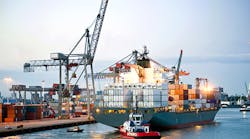If you can’t take another column about China, please turn the page. I realize some readers are weary of the subject, and others object to the notion that there’s any way to defend our trade policies with that nation. To one group, China represents the world’s greatest economic opportunity, while the rest see it as the greatest threat to our future prosperity, and freedom.
There are in-between views. I’m a free-trader to the extent that I expect all traders to respect by the same regulations; I’m a fair-trader to the extent that I want violators of that standard punished. At a social event recently someone who’s well connected and well regarded in the metalcasting industry expressed some exasperation that many of his contacts (meaning also, our readers) had grown irrational in their intolerance for the subject. I’ve noticed this, too, having been the recipient of random messages blasting me for taking “the wrong side.”
For that reason, I am heartened to see some serious effort developing around one fairly essential point: the failure of China to manage its currency in a responsible fashion.
Recently, the American Foundry Society encouraged members to contact the U.S. Treasury Department to urge the Bush Administration to cite China for currency manipulation in an upcoming report to Congress. The initiative from AFS and other trade groups seems to be timed to the April White House visit by Chinese president Hu Jintao. There are also legislative efforts to slap Chinese imports with tariffs up to 27.5%, in order to address the trade deficit that grows — at least partly — because Chinese central bankers are working so hard to suppress inflation there, notwithstanding the sustained growth of their domestic economy.
Think of it: China is the world’s largest consumer of raw materials, and now ranks as the world’s fourth-largest economy after a 2005 GDP growth rate of nearly 10%. The International Monetary Fund recently revised its 2006 forecast for Chinese GDP growth from 8.2% to 9.5%. If you want to determine which side of the divide you belong to, first contemplate those figures and decide whether you think that’s good news, or not.
To those who see China as a great economic opportunity, China’s economic growth is nothing but progress. It means more consumers buying more products, more manufacturers producing more goods that will be affordable to more consumers all around the world.
To those who see China as a threat to our own prosperity, China’s expansion is taking away opportunities for the rest of the world’s workers, manufacturers, and suppliers. It is costing us as consumers, too, as China’s demand for raw materials and energy supplies drives up those costs for the rest of the world.
Both of these opinions appear to be based on facts — the numerical data — but I’m inclined to think there’s more passion than reason in these arguments. They proponents are interpreting the facts to support their sentiments, and both are correct.
Both are also wrong. To see China as an unlimited growth opportunity (as many investors do) ignores very serious concerns about the controls China exercises over citizens and their choices. To see China as a threat to our prosperity overlooks our need, if only as an economic principal, to expand our global influence.
There is only one alternative to growth — recession. That is why the issue of currency is critical. It clarifies the reasons we can be so passionate about these matters. Currency is not merely a detail in our pursuit of free trade or fair trade. It’s a matter of trust.
Chinese officials know it’s critical, too. Last year they grudgingly reevaluated the yuan upward 2.1% and changed their monetary approach to what is referred to as a “managed float.” It roughly means they’ll “reevaluate” their currency from time to time, as they determine it’s necessary. And, that ought to be a factor in your determination, too.








